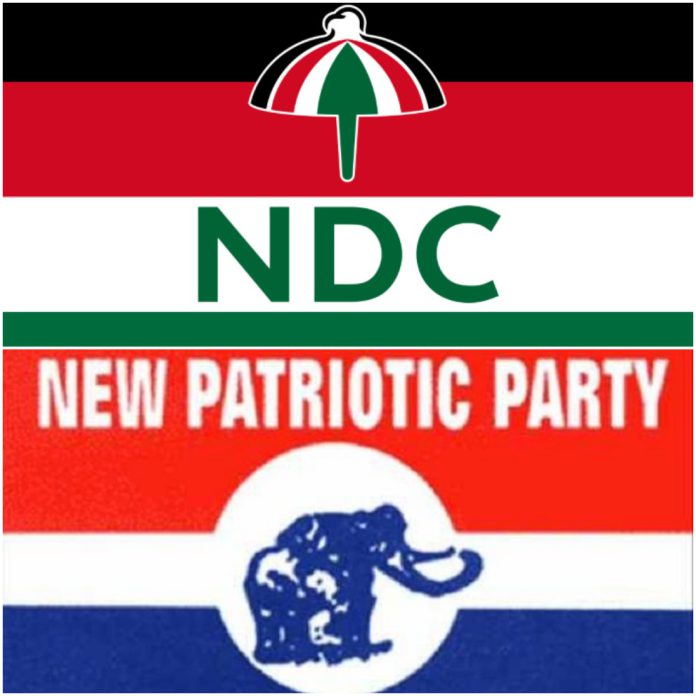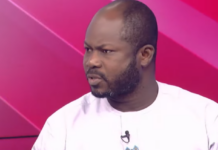
Like it or not, Ghana is a two-party State and is highly likely to remain so for a very long time. The probability of a third political party capturing the reigns of political power from the nation’s two-most-dominant-political parties in the country is almost zero ie nearly impossible.
But hey, who am I to say otherwise, we live in a world in which what is termed as ‘impossible’ is occasionally redefined as feats previously thought to be impossible but are achieved. So in the near future a not so respected political party might surprise the two dominant parties and take control of the helm of affairs.
Before I continue I would like to unequivocally state that, neither am I a political analyst or expert nor hold any sort of certification in any political-related course or programme from any recognised tertiary institution in the country or beyond.
But although not a political analyst or scientist, it is with keen interest have I, over the years observed how the two main political parties – the New Patriotic Party (NPP) and the National Democratic Congress (NDC) – carry themselves, their ideologies and beliefs and most importantly what they do when in power.
The two political parties say one thing in opposition and do another while in power, and not that its surprising but it sometimes becomes very irritating.
With emphasis on former President John Mahama and incumbent President Nana Akufo-Addo’s first terms in office, I will in this opinion piece, talk about certain actions and inactions of the two parties I find extremely irritating.
NDC’s lukewarm attitude towards corruption fight
The erstwhile NDC administration failed woefully in its fight against corruption, the party then in power seemed to condone corrupt practices rather than vanquish it as its founder, former President Jerry John Rawlings sought to do in the 1970s and early 1980s when he overthrew the then governing governments at the time for being excessively corrupt.
And I use the word ‘condone’ because the then President, John Dramani Mahama, for reasons best known to him alone, failed to crack the whip on corrupt appointees. His way of dealing with alleged corrupt appointees was re-designating them to other ministerial positions, thereby ‘covering up’ for lack of better words or not properly addressing the allegations leveled against his appointees.
His ‘forgiving’ attitude towards corrupt-tagged appointees indirectly fuelled corrupt practices in his government.
I wouldn’t say most of Mr Mahama’s appointees were corrupt, am only saying that the few corrupt ones made his entire government look disgracefully and unrepentantly corrupt, which ultimately resulted in his defeat in the 2016 general elections.
Let me remind you of a few corruption scandals that rocked Mr Mahama’s government.
Do you remember the Ameri Power deal which cost the country some $600 million dollars instead of $220 million? What of the Ghana Youth Employment and Entrepreneurial Agency scandal in which millions of Ghana cedis were illegally paid to individuals and companies?
Then was SADA also, as much as Ghs 32 million paid to ACICL to plant five million trees in the savannah zone, but only 700,000 trees were accounted for. It was also found that SADA spent GH¢15 million on guinea fowls, but could only account for a few of the birds.
The $3.6 million bus branding saga, and the list goes on and on.
Even when out of government, the NDC continues to battle corruption allegations, that too from foreign investigative bodies such as the FBI and USA’s Securities and Exchange Commission (SEC). Instances are the Airbus bribery scandal and Turkish AKSA power plant.
NDC’s politicisation of almost all national issues
It’s only normal for a political party in opposition to politicize and be propagandist about issues to make the incumbent government look bad in the eyes of citizens so as to be able to wrestle power from the governing party.
And as saddening as it is for opposition parties to politicize issues of national interest, it is the norm in most countries around the world, particularly in countries that practice democracy.
In my opinion, the NDC seems to have formed a character out of politicizing issues of national interest as it habitually politicizes every single issue in the country.
In their eyes, the NPP can never do anything right. To the NDC, the NPP government does every single thing with a parochial interest, particularly given the increasing cases of corrupt allegations leveled against members of the ruling NPP government.
Some arguments made by the NDC holds water and are true, but they tend to dwell more on the political side and end up politicizing the entire issue rather than arguing out the facts and pressuring government to do the right thing.
NPP’s ‘all-knowing attitude’ but nothing to show for it
The ruling NPP party has I have observed, is a party that likes to come across or appear to Ghanaians as a highly intellectual political party. Although not said aloud, the party subtly prides itself of having members with high intellect prowess than the opposition party.
This is evident in how the NPP, then in opposition and led by Dr Bawumia used statistics, data, and extensive research on the country’s economic growth, macroeconomic stability, inflation among others to challenge the NDC on how it was ‘wrongfully’ managing the economy.
Remember the 72 questions Dr Bawumia asked the late Vice President Amissah Arthur which went unanswered?
Another instance was when earlier this year, Dr Bawumia now Vice President of the nation, during the town hall meetings organized by government, projected graphs and charts to analyze and prove or justify why the NPP government is doing better than the NDC government in the first term of the two parties.
The NPP is so ‘knowledge-hungry’ to the extent that, it even takes advantage of scholarship schemes meant for brilliant but needy students. (GetFund scholarship scandal).
With the calibre of individuals in the NPP, I dare say that, the NPP might have more intellectually inclined individuals than the NDC.
But the sad thing is that, with all the intellectuals and highly knowledgeable persons in the NPP, the NPP seems not to be able to do anything distinctively different from the NDC. The nation seems not to benefit from the ‘pool of knowledge’ found in the NPP.
With the intellectual ‘superiority’ the NPP prides itself, it is expected that they would have so far done a better job than the previous administration, but the ‘value seems to be the same.’
NPP’s addictive borrowing
The NPP when in opposition, zealously persecuted the NDC for borrowing too much. To the NPP, the NDC needed not to borrow so much as it was of the view that there was money in the country needed by the then NDC government to effectively run the country.
The money they said was embedded in the nation’s natural resources but the NDC did not know how to ‘geniuosly’ use them to raise funds needed by the country.
Fast track forward, the NDC goes out of government, the NPP comes into power and the NPP is doing double of what it had persecuted the NDC for doing while in opposition.
The NPP under the leadership of President Akufo-Addo, in just its first term, is arguably the only government to have borrowed more than any other government under the 4th Republic.
The NPP government borrows and you can’t really tell what the money is being used for.
Former President Mahama during his tenure borrowed a lot, but testament or prove to his enormous borrowing are the E-Block Senior high schools built across the country, the Kwame Nkrumah Interchange aka Circle Dubai, construction of Allied Health Universities, the Bank of Ghana Hospital, the reconstructed 420 bed Ridge Hospital, all among a tall list of other infrastructural edifices.
The NPP on the other hand, has nothing to show for the excessive borrowing it has made over the years. The NPP government always talk about the macroeconomic fundamentals and how they have made them strong and revived the economy.
Perhaps, that is the only justification they have for borrowing so much; to strengthen the macroeconomic fundamentals and revive the country’s ‘dying economy.’
The NPP through its excessive borrowing has worsened Ghana’s debt burden as it has more than doubled Ghana’s public debt and increased the nation’s debt to GDP ratio.
And with the recent $1 billion loan facility from the IMF, to fight the global coronavirus pandemic, Ghana’s debt to GDP ratio is now said to be 76%.
Presenting different macroeconomic data to Ghanaians and IMF
Whether the incumbent NPP government likes to admit it or not, it is evident that, it has for the past two years or more been lying to Ghanaians.
The NPP government argues that it has not lied to Ghanaians by reporting different economic data to Ghanaians and the IMF, because in the its calculation of the nation’s fiscal deficit, it excludes government payments or liabilities in the financial and energy sectors whereas the IMF includes the two in its calculation of a nation’s fiscal deficit.
Also the government argues that, in its calculation of international reserves it includes revenues or receipts accrued from oil production which the IMF on the other hand excludes in its calculation of a country’s total reserves.
But this explanation given by government makes no sense as it clearly knows that, its calculation of fiscal deficit and gross international reserves along with the nation’s current account and primary balance does not meet international standards (the clear reason why the IMF insists on the inclusion of costs incurred in the financial and energy sectors to the country’s fiscal deficit).
Below is the table comparing and revealing the disparities in the two set of macroeconomic data presented to parliament and the IMF on some macroeconomic indicators namely: the Fiscal Deficit (in percent of GDP), Primary Balance, Current Account Balance and Gross International Reserves, contained in page 24, paragraph 100, of the 2019 Budget Statement and page 18, point 71, of the 2020 Budget Statement against the data from the IMF statement (contained in page 3).

Source: Budget Statement of Ghana (2019, 2020) & IMF Statement (2020)
Senior Fuaad Nii Dodoo Dodoo, is a writer with Ghana’s most comprehensive online news portal, Adomonline.com.



![Mahama won’t abandon NDC people for NPP – Gbande defends appointments [Audio]](https://www.adomonline.com/wp-content/uploads/2025/07/1000460820-218x150.jpg)

![Mustapha Gbande ‘exposes’ NPP over Ablekuma North rerun [Listen]](https://www.adomonline.com/wp-content/uploads/2025/07/1000460827-218x150.jpg)
